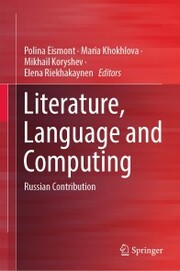<p>This book brings together selected revised papers representing a multidisciplinary approach to language and literature. The collection presents studies performed using the methods of computational linguistics in accordance with the traditions of Russian linguistic and literary studies, primarily in line with the Leningrad (Petersburg) philological school. The book comprises the papers allocated into 2 sections discussing the study of corpora in language, translation, and literary studies and the use of computing in language teaching and translation and in emotional text processing. A unique feature of the presented collection is that the papers, compiled in one volume, allow readers to get an understanding of a wide range of research conducted in Saint Petersburg State University and other Russian leading scientific institutions. Both the classical tradition of Saint Petersburg philology and the results obtained with the help of new computer technologies as a sample of the symbiosisof technologies and traditions, which bring research to a qualitatively new level, arouse interest.</p>
Polina Eismont is Associate Professor at Ludmila Verbitskaya Department of General Linguistics, St. Petersburg State University. Her research interests include language acquisition and psycholinguistics, text linguistics, cognitive linguistics, event structure, music semantics, and syntax of nulls. She obtained her Ph.D. from St. Petersburg State University in 2008. She is Author of more than 40 papers in domestic and international journals and volumes and Co-editor of two CCIS volumes Language, Music, and Computing (Springer Verlag, 2015, 2019) and a book Language, Music and Gesture: Informational Crossroads (LMGIC 2021) (Springer Singapore, 2021).Maria Khokhlova is Associate Professor at Department of Mathematical Linguistics, St. Petersburg State University. Her research lies at the intersection of natural language processing, corpus linguistics, and machine learning and was supported by grants and scholarships awarded by Russian and international foundations (RSF, DAAD, Visegrad Fund, Erasmus). She holds a Ph.D. from St. Petersburg State University (2011) and was awarded the St. Petersburg Government Prize for science and teaching (2020, 2022). She is Author of more than 100 articles in domestic and international refereed journals and volumes.Mikhail Koryshev is Associate Professor at Department of Comparative Studies of Languages and Cultures and Dean of the Faculty of Philology, St. Petersburg State University. His research interests focus on German language and culture, literary studies, as well as on Catholic hymnography and liturgiology. He obtained a Ph.D. in Philology from St. Petersburg State University in 2005. He was Visiting Lecturer in Germany, and his research was supported by Erasmus and DAAD-Stiftung. He is Author of more than 60 papers in Russian and international peer-reviewed journals and book series.Elena Riekhakaynen is Associate Professor and Head of Ludmila Verbitskaya Department of General Linguistics, St. Petersburg State University. She obtained her Ph.D. from St. Petersburg State University in 2011. Her research interests include Phonetics and Psycholinguistics, especially Spoken Word Recognition and Multimodal Text Processing. She is one of the developers of the Russian Speech Corpus and the author of three books and more than 60 papers in linguistics and interdisciplinary studies. For her research, she has been awarded prizes from St. Petersburg State University, St. Petersburg City Administration, Russian Educational Foundations, and the Program Committees of several international conferences.
Chapter 1. Literature, Language and Computing: Russian Contribution.- Chapter 2. Self-Repair in Russian Spoken Discourse in Psycholinguistics Aspect: Correlation Analysis and Quantitative Data.- Chapter 3. A Lexicographic Portrait of a Russian Microsyntactic Unit.- Chapter 4. Plain and Natural vs Accurate and Unambiguous: Pronominal Intrasentential Anaphora in Russian Legislative Texts.- Chapter 5. The Old Church Slavonic Corpora and Their Use in Language Studies at the University.- Chapter 6. Core coordination units in macro- and microdiachrony: experimental data.- Chapter 7. The Use of Futur Antérieur in the Past in Old French: Experience of a Corpus-Based Study.- Chapter 8. Nachhaltigkeit in media crisis discourse.- Chapter 9. Using Corpora for Verifying Language Choices in Translation.- Chapter 10. Stylometric Methods in Comparative Analysis of Text.- Chapter 11. Lexical Diversity of Russian Poets.- Chapter 12. A semantic corpus of Russian literature of 18 century: its current state and its future.- Chapter 13. Multimedia dictionary of verbal vocabulary: concept, structure, implementation.- Chapter 14. Incorporating informal e-learning into foreign language teaching through collaborative personalization.- Chapter 15. Pedagogical peer-to-peer online practice as a means of forming professional competence in distant learning format.- Chapter 16. To the East Slavonic proverbs of the thematic group Learning - inattention (as seen in the new Electronic dictionary of current active East Slavonic proverbs).- Chapter 17. Opportunities of using Dental Internet resources in teaching the language of specialty in the course of Russian as a foreign language.- Chapter 18. Machine Translation vs Human Translation of Artionyms.- Chapter 19. The Emotion in Text Analyzer: How to Visualize its Output?.- Chapter 20. The Multimedia Corpus of Russian Ironic Speech for Phonetic Analysis.- Chapter 21. Theory of Mind and the Mechanism of Imagination for a Companion Robot.
„E-Book“ steht für digitales Buch. Um diese Art von Büchern lesen zu können wird entweder eine spezielle Software für Computer, Tablets und Smartphones oder ein E-Book Reader benötigt. Da viele verschiedene Formate (Dateien) für E-Books existieren, gilt es dabei, einiges zu beachten.
Von uns werden digitale Bücher in drei Formaten ausgeliefert. Die Formate sind EPUB mit DRM (Digital Rights Management), EPUB ohne DRM und PDF. Bei den Formaten PDF und EPUB ohne DRM müssen Sie lediglich prüfen, ob Ihr E-Book Reader kompatibel ist. Wenn ein Format mit DRM genutzt wird, besteht zusätzlich die Notwendigkeit, dass Sie einen kostenlosen Adobe® Digital Editions Account besitzen. Wenn Sie ein E-Book, das Adobe® Digital Editions benötigt herunterladen, erhalten Sie eine ASCM-Datei, die zu Digital Editions hinzugefügt und mit Ihrem Account verknüpft werden muss. Einige E-Book Reader (zum Beispiel PocketBook Touch) unterstützen auch das direkte Eingeben der Login-Daten des Adobe Accounts – somit können diese ASCM-Dateien direkt auf das betreffende Gerät kopiert werden.
Da E-Books nur für eine begrenzte Zeit – in der Regel 6 Monate – herunterladbar sind, sollten Sie stets eine Sicherheitskopie auf einem Dauerspeicher (Festplatte, USB-Stick oder CD) vorsehen. Auch ist die Menge der Downloads auf maximal 5 begrenzt.






